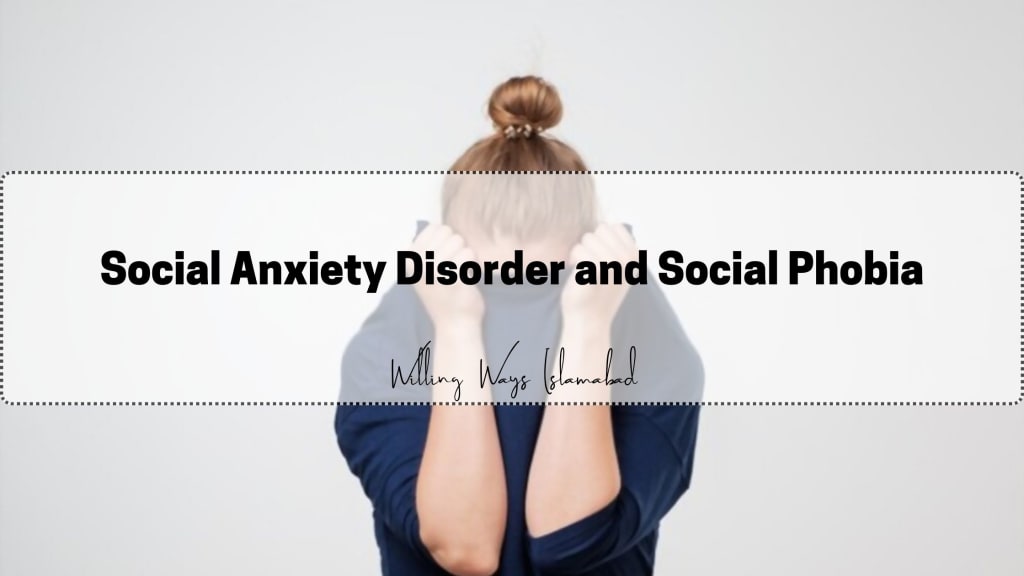Social Anxiety Disorder and Social Phobia
Their hands and voices might tremble, their palms might get sweaty, and their face blush.

Overcoming Social Anxiety Disorder (Social Phobia) is not a simple process, and it might take a long time at the best addiction treatment center in Islamabad before a sufferer becomes Free of this terrible condition. Tools (therapies, programs, medication etc.) are available, and some have proven extremely efficient in treating Social Phobia. Irrational fear of people, social gatherings, public speaking or any situation and the Symptoms of Depression In Children where a person could find themself exposed to criticism or “judgment” of other people is characteristic of Social Nervousness Problem (Miserable) or otherwise called Social Fear.
People suffering from Social Anxiety Disorder experience overwhelming anxiety and exaggerated fear whenever they have to perform some action or sometimes appear in front of unknown individuals.
Fear of public speaking and performing on stage are the most common forms of Social Phobia. Giving a speech at your best friend’s wedding or a birthday party, discussing the problems and taking part in debates at your workplace, school or community hall meetings, sitting an oral exam at university or college in front of fellow students, performing in a school play, and so on, are just a few examples of numerous tasks and activities that almost everybody will sometimes face in their lives.
Some people deal with situations like these very confidently and calmly, and many enjoy being at the center of attention. But, for most people, jumping into the spotlight is certainly not something they would rate very high on their “wish list.” When faced with such tasks, most individuals feel slightly anxious.
Although these symptoms are characteristics of Social Phobia, by no means “everyone” who experiences them from time to time could be categorized as a Social Anxiety Disorder sufferer (or a Social Phobic). Some people are just shy by nature, but their shyness doesn’t interfere, to a great extent, with the overall quality of their lives. Despite occasional disappointing or embarrassing experiences, they still manage to achieve their goals and lead happy and proactive life.
To draw a line between “shyness” and mild Social Anxiety is sometimes almost impossible. However, suppose the symptoms and fear become so severe and completely out of control that they start interfering with a person’s normal, routine activities, career, family and social interactions. In that case, it is certainly the time to seek professional medical advice and help.
Many Social Anxiety Disorder sufferers, from the fear of further embarrassment or criticism, try to hide their condition. It is not unusual for Social Phobics to turn down promotions at work just because the new position involves, for instance, more dealings and communication with the clients, more meetings, presentations, conferences etc. In some cases, Social Anxiety Disorder victims start avoiding situations in which they can find themselves exposed to “judgment” from others.
They come up with different explanations and excuses for why they could not attend a party, business lunch or the school’s parent-teacher meeting. Some can develop extreme avoidance behavior (same as in cases of severe agoraphobia) and find themselves locked in their homes, frightened and completely isolated from the outside world.
Besides public speaking and stage performances, many other circumstances might trigger the alarm in mentally disturbed Social Phobia sufferers. Some of the most common situations which can cause fear or panic are:
- meeting with the authorities
- meeting and introducing to new people
- receiving unknown visitors
- being watched while working
- eating and taking food in front of others
- bullying and names calling
- using the public toilets
- talking on the phone to unknown people (or even sending e-mails)
- writing or signing documents, forms or checks while being watched
- fear of trembling hands (while serving drinks or food to their guests)
- fear of facial blushing
People suffering from Social Anxiety Disorder are reluctant to start or participate in a conversation and find it very difficult to maintain eye contact with others. Sufferers are often unsure of their overall appearance; they do not know what to do with their hands or body posture. Social Phobia victims are overcautious and always alert, checking their surroundings to see if anyone is watching them. If tension and the symptoms become very severe, sufferers might experience panic attacks.
Social Anxiety Disorder can be General (includes fear in almost every situation when other people are around) or Specific (when a person is afraid of a specific activity or condition, for example, public speaking). Specific Social Phobia mostly affects people whose occupations are directly related to dealings with the public or audiences (actors/actresses, singers, sales personnel etc.). Most of the sufferers fear more than just one situation.
Social Phobia is, unfortunately, a very common condition in today’s modern society, and it is present in almost every culture and nation. It tends to start occurring in the very early stages of life. In approximately 40% of all cases, it begins before the age of 10 and, in 95%, before the age of 20. 1-2% of men and 2-3% of women suffer social phobia. The condition might become extremely nasty and serious, and it can make literary turn the lives of its sufferers into a nightmare. Many victims develop secondary infections such as depression, agoraphobia or other phobias. To ease the fear, some Social Phobics start abusing alcohol and legal and illegal drugs, which make things even worse and more difficult.
Early detection and the right treatment are essential to overcoming Social Anxiety Disorder. Cognitive-Behavioral Therapy and medication (Beta-Blockers, Antidepressants and Anxiolytic) are the most commonly used methods for treating Social Phobia. Some alternative therapies and programs former sufferers developed also show positive results.
About the Creator
Willing Ways
Willing Ways is the Best addiction treatment center in Pakistan. We are the pioneer in drugs & alcohol treatment centers with outstanding services and a history of 43 years. We deliver quality writing that is beneficial for you.






Comments
There are no comments for this story
Be the first to respond and start the conversation.